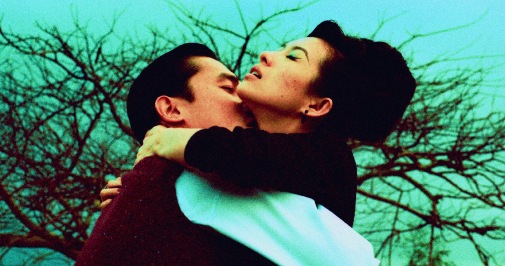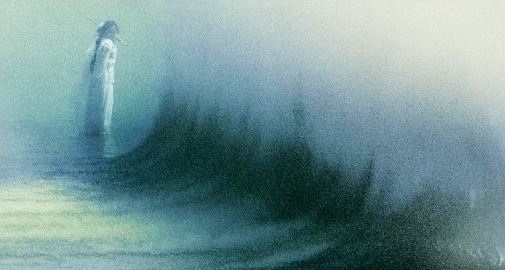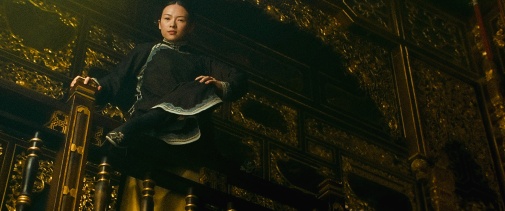MUBI: Three by Wong Kar-Wai
 Monday, July 17, 2023 at 11:22AM
Monday, July 17, 2023 at 11:22AM 
Happy birthday to Wong Kar-Wai. The Hong Kong auteur turns 65 today, the same day I say goodbye to 28 and welcome my 29th year –we're birthday twins! But of course, I've loved the director long before discovering we shared July 17th, having fallen for his cinema when I glimpsed Maggie Cheung and Tony Leung cross paths in slow-motion, saw the treacherous enchantment of a kitschy lamp lost in Buenos Aires, experienced a Nouvelle Vague color kaleidoscope to the sound of "California Dreamin'." It's only fitting to celebrate the date by pouring over some of Wong's most ravishing pictures, remembering his mastery as we mourn a decade since his last feature.
Join me as I consider three films MUBI has programmed specially for July, a collection they call As Time Goes By. A trio marked by lavish spectacle, they reach for the stars – a wuxia experiment, a sci-fi lament, and a martial-arts biopic like none other…



ASHES OF TIME (1994/2008)
The most chaotic production in Wong Kar-Wai's career, Ashes of Time exists now in two forms. There's the original version, released to tepid critical reaction and poor box office performance in 1994. And then, we have the re-scored, re-edited, altogether rebuilt Ashes of Time Redux from 2008. Since the first cut is only available in Asia, it's easier for international cinephiles to know Wong's action epic only in its later form. That's how he'd want it too, though more recent alterations to his canonical masterpieces have led many to question how the director handles his past work, forever tinkering, mayhap bastardizing.
Even so, it's hard not to be on Wong's side when it comes to Ashes of Time, seeing as so much about its making went wrong the first time around. Inspired by the characters in Jin Yong's novels, the movie came to be during a period of wuxia resurgence where filmmakers like Wong, who'd grown up immersed in classic wuxia, began experimenting with the genre. The opportunity came in response to the director's early successes, blessing (or cursing) him with his biggest budget to that point. Sadly, production kept being delayed, giving Wong enough time to produce a parody of the picture's literary origins directed by Jeffrey Lau.
Such epic procrastination, the artist's way of dealing with chaos, didn't stop there. As the post-production stretched into endless nightmare, Wong came up with Chungking Express and Fallen Angels. Indeed, while descriptions of the original Ashes suggest an atypically prosaic work from the auteur, the Redux editing feels closely tied to the impressionistic cutting that defines those contemporary tales of 94 and 95. On the other hand, its color story is stylized to a degree more easily found in Wong's filmography from 1997's Happy Together to 2007's My Blueberry Nights - so much so that DP Christopher Doyle has expressed displeasure with the changes.
Questions of cinematographer intent aside, Ashes of Time Redux is an object of unfathomable beauty, stretching its depiction of the past so wildly it teeters on the edge of hallucination. Every hue is distilled to acid, burning bright through screen and audience's eyes, risking gaudiness as it pursues pure abstraction. The rest of the film follows suit in editing, sound and score, character narrative made base element, almost incomprehensible beyond its merit as scaffolding for form. Emotion expressed through audiovisual tools alone becomes the film's tenet, even more so than the martial arts which define its genre.
In other words, if you're looking for Wong Kar-Wai-directed fights, go straight to The Grandmaster without stopping here. Only a single sequence can be described as action-adjacent, the rest an undefined flurry of gesture turned visual verse. What remains can inspire adrenaline exclusively to those whose heart pumps faster when celluloid explodes in colors from another world, cuts that defy intelligibility, sound contradicting the nature of human ears. Though maybe that's the greatest trick in the flick – it suggests the kind of narrative abandonment of Hong Kong action cinema but makes that sacrifice at the altar of optic-sonic-madness rather than to the gods of material violence.



2046 (2004)
Even if you've recently seen Days of Being Wild and In the Mood for Love lately, 2046 might be hard to figure out. Though conceived as a loose sequel to those past works, the unorthodox sci-fi moves in erratic motion, splintering four storylines across time, place, and women. Linearity dilacerated through the multi-dimensional script, each moment's further shattered in editing. So forth, 2046 hints at a complex narrative while behaving in a fashion expected from plotless mood pieces. It's a tension Wong never quite resolves, though that's a feature rather than fault. No matter the disorientation, there's a logic internal to this anti-puzzle.
As ever, it's the logic of bloody red hearts pulsing with a love that both animates and deadens. It's the reason of emotion without sense, the ghostly ardor that remains after memories have faded into nothing, made more dolorous because their origin is forgotten. To remember is a writer's mission and a technology of his imagined future. It's means of finding lovers and losing them, too, maybe losing oneself along the way. To remember entirely is a fantasy, so we create imagined worlds where it can happen. To remember is a pain, so we get drunk and indulge in vice as anesthesia. To remember is to come together. Or is it to come apart?
2046 is a mystery to the end but is viscerally felt, nevertheless, deep in the gut like some vicious punch. That merciful aggression is delivered by a director at the top of his game, a cinematographer inspired to bend reality past what should be possible in the waking world. Designing it all, William Chang finds new variations within the aesthetics defined for his previous Wong films, going as far as positing a tomorrow vis-à-vis the lovelorn 1960s. And yet, for all the retro-futuristic pleasures, the decadent score by Shigeru Umebayashi, and all other formal conceits, what most impresses is the cast navigating their way through red-tinged phantasmagoria - Zhang Ziyi the first among equals. In a just world, such greatness would have won her an Oscar.



THE GRANDMASTER (2013)
Like Ashes of Time, The Grandmaster exists in different forms. There's the original version released to Chinese theaters, then the slightly shorter one screened at the Berlinale, and, finally, a Weinstein-mandated abomination for the movie's American release. While the first two are reasonably similar and only differ by about seven minutes, the third cut removed over 20 minutes of footage, with title cards added to provide context for Western audiences. By no means should you watch the latter, its need to foreground historical narrative above languorous mood a complete betrayal of what Wong Kar-Wai was attempting with the biopic.
And what was that, you may ask? Well, lovesick impressionism, the expressivity of light and color brought to full bloom, time dilated into a cinematic trance - the usual. Only this time, the director's devised his work around real-life figures. The Grandmaster purports to tell the story of Ip Man, a 20th-century Wing Chu fighter whose existence crossed into legend decades before Wong ever considered adapting it to cinema. For moviegoers, he's likely best known as the man who trained Bruce Lee or the inspiration for the Donnie Yen-starring Ip Man movie series. This matters little to Wong's movie.
Neither his involvement with the movies nor his cultural impact are of much concern to The Grandmaster. Instead, the picture is a mood piece in perfect Wong tradition, with Tony Leung playing the title role as the kind of protagonist that falls into the background as his movie's ultimately commanded by a female presence. She's Zhang Ziyi, once again delivering an immense performance. However, she's no supporting player as she was in 2046, gradually asserting herself as a structuring force that rules over the picture's evocative flow.
Her Gong Er is the ultimate anchor dropping through all the spectacle, shattering moral binaries and rigid hierarchies on its way down, ready to ground it all in aching sentiment. I'll never forget her fight in the snow, fur-clad like a dark cloud in the frosty setting, or the final meeting between a grandmaster's daughter and the man who came to conquer the title. That moment, presented as romantic epilogue, is the Rosetta Stone that unlocks what came before. Rather than taking on martial-arts cinema by aping convention, Wong delivers something closer to a cinematic ballet.
In this cinematic conjecture, each fight is a different dance. And, like in many an old-school musical, the choreography becomes the vehicle through which two souls meet and intertwine, love in motion with Tony Leung and Zhang Ziyi our warring revision on Frank Sinatra and Ginger Rogers. To modulate such notions, William Chang designs a world that feels hermetically closed within shadow, a sideway glance away from reality made more ethereal by Philippe Le Sourd's cinematography. For those achievements, The Grandmaster became the first Wong Kar-Wai film nominated for an Academy Award, in Cinematography and Costume Design. It deserved so much more.
Are you a fan of these three by Wong Kar-Wai? If you were to program a trio of his titles, which would you choose?



Reader Comments (5)
For me, Chungking Express, Happy Together, and In the Mood for Love.
I agree with you Claudio on the awful U.S. cut of The Grandmaster as I saw that version in theaters. While it looks great, it felt really confusing to watch and I thought the pacing was off and I hated the additional title cards in the film. I've seen the 130-minute Chinese cut which I used to have in my old laptop but no anymore as that is the version that I recommend though I wouldn't mind watching the international cut. It's a shame MUBI has to present that awful Weinstein cut of the film.
2046 is my favorite of his. For a trio I'd go Chungking Express, Happy Together, 2046.
Fallen Angels is in my all-time Top 10. Chungking Express and In the Mood for Love complete my WKW top 3, while wiping away a tear for not being able to include 2046.
2046 is my personal favorite of his. Chungking Express, Happy Together, and 2046 for a trio. 8 ball pool
I personally think Ashes of Time is one of WKW’s best, if not the best film, and the original version is miles better than the redux version. It’s my personal top 3 favourite film of all time. I am always sad that it is so underappreciated.
The greatness of Ashes of Time is that, despite its chaotic production, WKW was able to come up with a brilliant narrative in the cutting room. You experienced the story with the protagonist, when he was meeting various people and remembering his past, slowly to reveal the source of all his pain and regret with the pivotal scene with Maggie Cheung’s character – when it all made sense. I strongly disagree with all those who say that there is no narrative or that it is difficult to follow (it has won WKW some best script award in HK!).
And to those who know, it strangely ties in with the characters of the Jin Rong novel as an imagined back story of them (though by that point it’s not a relevant consideration at all as the film completely stands on its own).
The story is filled with profound truths about loneliness and regret (which makes you wonder what WKW had personally experienced to have such insights), with such memorable performances from Leslie Cheung, Brigitte Lin (in a large but inconsequential role), Maggie Cheung (in a small but pivotal role). The conclusion – when you have lost someone, the only thing you can do is not to forget (even though it would bring with all the pain and regret) – hits hard.
I like the original much better than Redux because: (1) the more splintered scenes fits the theme better, because it feels more like broken up memory (or hallucination, as you put it) and scenes of the past you longed for; (2) the original score is much much much better than the redux version, notwithstanding WKW enlisting Yo-Yo Ma.
I would also say that the story structure of Ashes of Time totally inspired that of 2046 – the protagonist met a variety of people (and probably hurting a few along the way – Brigitte Lin vs Zhiyi Zhang & Gong Li) who made him realise that the person he lost (Maggie Cheung in both case!) is his true love and he is filled with regret. And one person out of those had a good ending (Jacky Cheung vs Faye Fong).